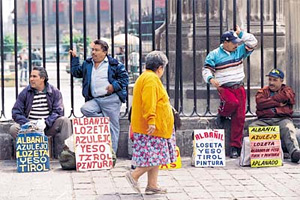 |
 |
 |
 Editorials | July 2006 Editorials | July 2006  
Mexico's Missing Prosperity
 Robert J. Samuelson - Washington Post Robert J. Samuelson - Washington Post


| | People line up for day-labor jobs in Mexico City. Such work in the "informal sector" provides a living for many. (Christobal Perez) |
The subtext for the United States' immigration debate is Mexico. Why doesn't its economy grow faster, creating more jobs and higher living standards? That's the question that inevitably confronts the winner of this Sunday's Mexican presidential election, but it is also a critical question for Americans. A more prosperous country would not be sending so many of its poorest citizens north. Since 1990 about 20 to 25 percent of U.S. immigrants have come from Mexico.

Here is an illuminating comparison. In 1970 average incomes in South Korea were about half those in Mexico. By 2004 Korean incomes were more than twice Mexico's. During those decades, reports the Organization for Economic Cooperation and Development (OECD), average Mexican incomes rose 57 percent, to $9,178 (expressed in constant "2000 dollars"); the comparable Korean gain was 574 percent, to $19,148.

It's not that Mexico has made no progress. Its economy was once crisis-prone, inflation-ridden and heavily insulated from foreign trade. Now it has quelled inflation (about 4 percent, down from 17 percent in the late 1990s), controlled government spending and opened up to trade. Before adoption of the North American Free Trade Agreement in 1994, tariffs on covered imports averaged 12 percent (and were much higher in the 1980s); by 2001 they were 2 percent. The last financial crisis - a collapsing currency, an outflow of money - occurred in 1994 and 1995. In recent years its economy has grown almost 4 percent annually.

But that growth - fine for an advanced country such as the United States - doesn't suffice for a poor country whose population is increasing (as is Mexico's) by more than 1 percent a year. In China, economic growth averages 9 to 10 percent annually; in India, about 6 to 8 percent. Mexico isn't in the same league.

Economies advance through the adoption of better technologies and business methods. Production and efficiency improve. Prices go down or incomes go up. Either way, people can buy more - more old stuff (say, food or housing); or more new stuff (say, Internet connections or iPods). In Mexico, this process is weak. To simplify slightly: Its economy consists of two vast sectors, each slow to adopt better technology and business practices.

One sector involves large, modern firms in semi-protected markets that limit the pressure to improve efficiency or lower prices. "Mexico's business sector is risk-averse. It's never had to operate in a true competitive environment," says Pamela Starr, an analyst for the Eurasia Group, a consulting firm. "It's operated with monopolies and oligopolies encouraged by the government."

An extreme case in point is Pemex, the state-owned monopoly oil company. Without competitors or complaining shareholders, its operations are lax. In 2004 Pemex had $69 billion in sales and 137,722 employees, according to its Web site; in the same year, Exxon Mobil had $291 billion in revenue and 85,900 employees. Telmex, which dominates the phone market, is often cited as another example. In 2004 Mexico had the sixth-highest phone charges for an average customer of 29 OECD member countries.

The other part of the economy is usually called the "informal sector." It consists of thousands of small firms - street vendors, stores, repair shops, tiny manufacturers - that theoretically aren't legal, because they haven't registered with the government and often don't pay taxes or comply with regulations on wages and hiring and firing. Almost two-thirds of Mexico's workers may be employed in the informal sector, according to one rough estimate by the International Monetary Fund.

The sector's size might suggest great entrepreneurial vitality. The trouble is that these firms are virtually compelled to remain small and inefficient. Because they're technically illegal, they can't easily get bank loans and can't grow too large without being forced to pay taxes or comply with government regulations. In Mexico, companies with fewer than 10 workers account for almost two-fifths of all employment. In the United States, such firms represent one-ninth of total jobs.

All this frustrates rapid economic growth - though the obstacles have diminished as Mexico has opened to foreign trade and investment. The harder question is what created this system. Lawrence Harrison, an economic development expert at Tufts University, blames culture. Latin American values, he says, have resisted change and encouraged "rent-seeking" by business elites - vying for government favors that provide protected markets. Asian societies, he argues, have been more accepting of change and have achieved the higher savings rates conducive to faster economic growth.

Economist William Easterly of New York University is skeptical of the cultural explanation and argues that de-emphasizing trade protectionism and government intervention requires time. "Advocates of free trade and free markets overpromise what can be accomplished in a short time," he says. Attitudes and institutions change slowly. "The payoff is in the long term," he argues.

On paper, the leading candidates for president advocate different economic policies. Former Mexico City mayor Andr?s Manuel L?pez Obrador of the center-left Democratic Revolution Party urges more government activism. Felipe Calder?n of the center-right National Action Party - the party of the incumbent, Vicente Fox - favors "the market." But each might have trouble enacting his agenda without a legislative majority, with the once-dominant Institutional Revolutionary Party controlling swing votes. At best, economic growth might improve slightly; at worst it might decrease.

For Americans, the implications are sobering. Mexico has long regarded immigration as an economic safety valve. Whoever wins, that won't change. | 
 | |
 |



